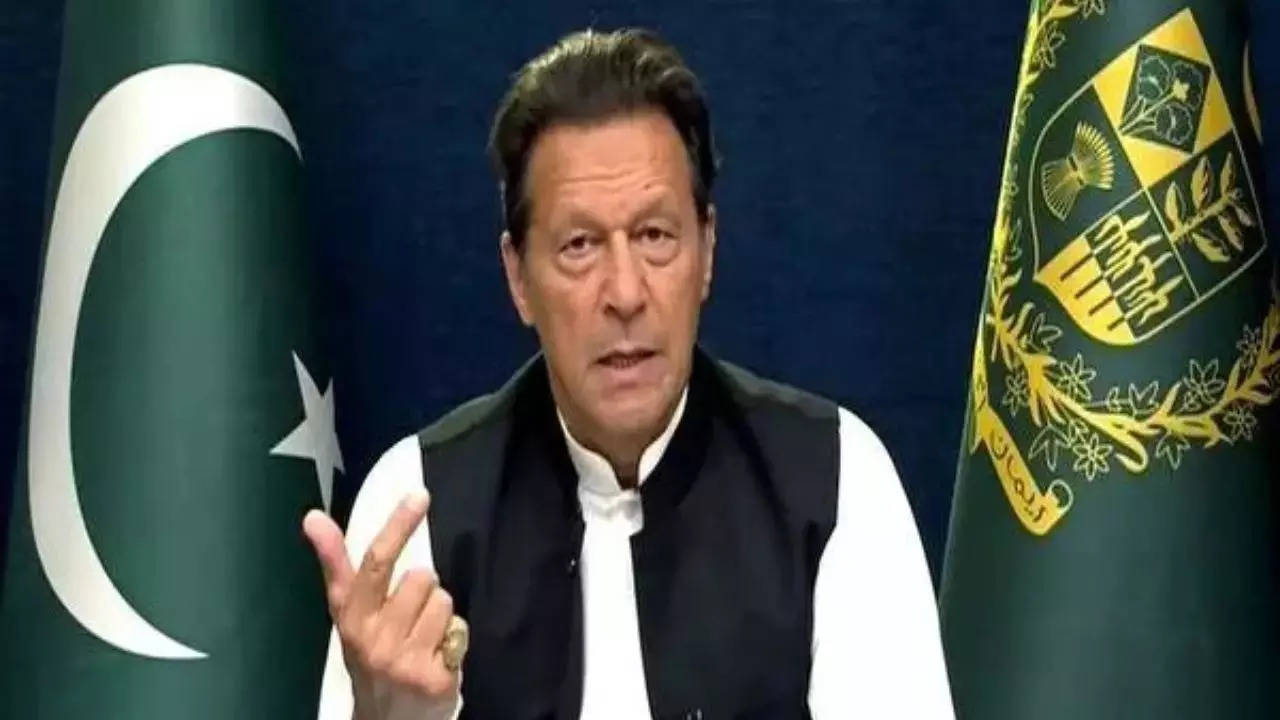[ad_1]
Former jailed Pakistan Prime Minister Imran Khan‘s party, Pakistan Tehreek-e-Insaf (PTI), has reiterated its demand for the resignation of chief election commissioner (CEC) Sikandar Sultan Raja, citing failure to hold “free and fair” elections.
The protest, led by PTI leaders and members of the national assembly, marched from the parliament to the election commission of Pakistan (ECP) demanding action against alleged poll rigging and injustices against their party, according to media reports.
Omar Ayub, the Leader of Opposition, spearheaded the demonstration, urging CEC Raja and other election commission members to step down. The February 8 general elections were steeped in controversy, with claims of massive rigging overshadowing the electoral process.
“The only job of the election commission was to conduct clean and transparent polls, but it failed to fulfil its constitutional duty,” Ayub stated during the rally, as reported by The News International.
The protest was met with heavy security, preventing demonstrators from reaching the ECP’s central office. Protestors also called for the release of PTI founder Imran Khan, who has been in prison since September last year. Initially held in District Jail Attock after his arrest on August 5, 2023, Khan was later transferred to the high-security Adiala Jail in Rawalpindi following his conviction in the Toshakhana case.
“The doors of courts have been closed on opposition leaders; our women are in jail, and history will remember them,” said PTI Chairman Barrister Gohar Khan, addressing the rally.
“Today, we have come out against this injustice. Our voice is not being heard in this House (Parliament). Whatever we said in the House, our voice was silenced. We want the women’s release. This is a clear violation of human rights,” he continued.
Another central PTI leader, Asad Qaiser, also addressed the protesters, highlighting the challenges faced by the party post-elections.
“On May 9, we were targeted on the pretext that we are not negotiating with anyone. Our voice is not heard in parliament, which amounts to our gross abuse,” said Qaiser.
Following the controversial elections, the Pakistan Muslim League-Nawaz and Pakistan Peoples Party formed a coalition government through intense negotiations. The results were fragmented, with independent candidates—many supported by PTI—winning 93 out of the 265 National Assembly seats contested on February 8.
The protest, led by PTI leaders and members of the national assembly, marched from the parliament to the election commission of Pakistan (ECP) demanding action against alleged poll rigging and injustices against their party, according to media reports.
Omar Ayub, the Leader of Opposition, spearheaded the demonstration, urging CEC Raja and other election commission members to step down. The February 8 general elections were steeped in controversy, with claims of massive rigging overshadowing the electoral process.
“The only job of the election commission was to conduct clean and transparent polls, but it failed to fulfil its constitutional duty,” Ayub stated during the rally, as reported by The News International.
The protest was met with heavy security, preventing demonstrators from reaching the ECP’s central office. Protestors also called for the release of PTI founder Imran Khan, who has been in prison since September last year. Initially held in District Jail Attock after his arrest on August 5, 2023, Khan was later transferred to the high-security Adiala Jail in Rawalpindi following his conviction in the Toshakhana case.
“The doors of courts have been closed on opposition leaders; our women are in jail, and history will remember them,” said PTI Chairman Barrister Gohar Khan, addressing the rally.
“Today, we have come out against this injustice. Our voice is not being heard in this House (Parliament). Whatever we said in the House, our voice was silenced. We want the women’s release. This is a clear violation of human rights,” he continued.
Another central PTI leader, Asad Qaiser, also addressed the protesters, highlighting the challenges faced by the party post-elections.
“On May 9, we were targeted on the pretext that we are not negotiating with anyone. Our voice is not heard in parliament, which amounts to our gross abuse,” said Qaiser.
Following the controversial elections, the Pakistan Muslim League-Nawaz and Pakistan Peoples Party formed a coalition government through intense negotiations. The results were fragmented, with independent candidates—many supported by PTI—winning 93 out of the 265 National Assembly seats contested on February 8.
[ad_2]
Source link








